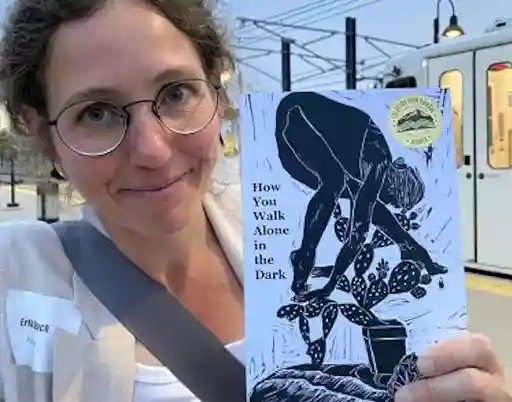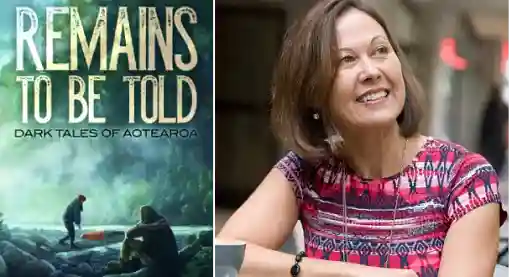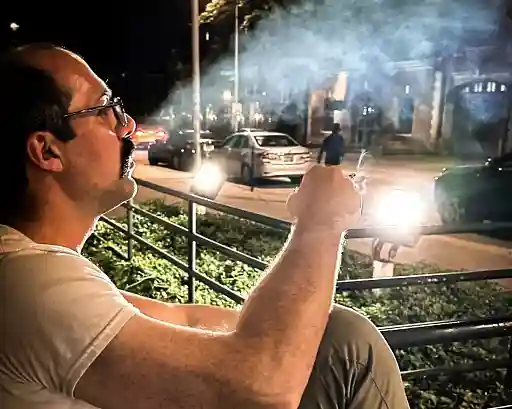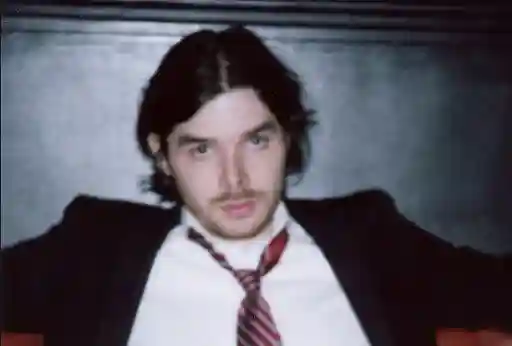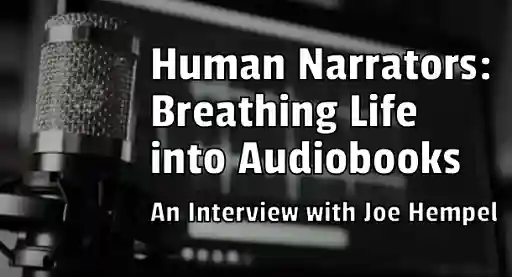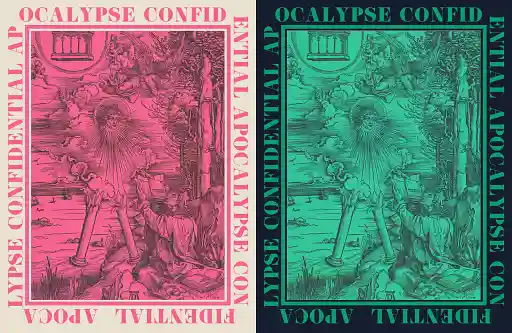Religious horror has been a popular genre for centuries, exploring the dark and often terrifying aspects of belief and its practices. From The Exorcist to Salem's Lot, these stories continue to captivate audiences and leave them wondering what lies beneath the surface. Ross Jeffery is a celebrated author of dark fiction who is well respected in the community. It was an absolute pleasure discussing horror in its various forms with him, as well as the potential of religious horror to engage and challenge our understanding of faith. Better the devil you know…
Thank you so much, Ross, for joining me in this discussion. In case anyone hasn’t heard of you, what can you tell us about yourself?
My names Ross Jeffery and I’m a Christian.
I’m also a Bram Stoker Award-nominated and multiple Splatterpunk Award-nominated author — that’s right, a Christian writing Splatterpunk and being nominated for a Bram Stoker Award, trust me, you should see the looks I get in Church.
My most notable works are the Juniper Trilogy (Tome — the second book in the series — was nominated for a Stoker and Splatterpunk award) and Only The Stains Remain (which was nominated for a Splatterpunk Award), but I’ve a whole lots of books out there, please do go check them out. I also have a slew of short fiction featured in many print anthologies.
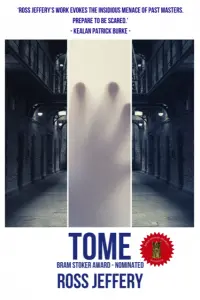 My horror tends to focus more on what people do to each other rather than the classic monster trope. There’s nothing wrong with that trope, it’s just not my slice of horror. I read it, sure, but when it comes to writing horror I’ve always been fascinated with how cruel people can be to one another.
My horror tends to focus more on what people do to each other rather than the classic monster trope. There’s nothing wrong with that trope, it’s just not my slice of horror. I read it, sure, but when it comes to writing horror I’ve always been fascinated with how cruel people can be to one another.
I tackle quite a lot of heavy themes in my work. I’m not really one to shy away from a tricky topic, because I’m of the opinion that writers should be free to create, but having said that, I always try to remain respectful and true to the story I’m trying to tell, without scrimping on any of the gory details... because we read horror to be horrified right? Some of the challenging topics my work tackles include: domestic violence (Juniper), racism (Tome), homophobia (Scorched), child abuse (Only The Stains Remain), and all of the above and then some in my short story collection, Beautiful Atrocities.
While I love writing and am enjoying some moderate success, it doesn’t pay the bills, so like many other authors out there, I have a day job. I currently work as a day centre manager for those suffering the effects of homelessness — it’s a challenging job, but hugely rewarding too. I count myself lucky to be able to do a job that I love.
I usually work on my writing projects in my spare time, which is quite limited given my job, family and home life, but somehow I’m making it work by ensuring that the time I do put aside for writing is protected from any outside interference and I defend that time with my life.
What are you currently working on?
Well, as many others can attest, it’s a busy world for a writer, especially an indie one.
Currently I am working on the final edits of my novel, The Devil’s Pocketbook, which is coming out through Darklit Press on May 23, 2023, which I’m pretty damned excited about. It’s a horror story that has its roots in folklore and myth, and is set in the English coastal town of Polperro. The story follows the struggles of a married couple (Erik and Lara) who have headed to the Cornish Coast to escape their daughter’s lingering ghost, but on arrival they discover that the town is hiding a dark and disturbing secret. This book is me firing on all cylinders and I believe it’s one of the best things I think I’ve ever written — I’ll let you, dear reader, be the judge of that when it comes out.
I’m also working on the edits of another book, I Died Too But They Haven’t Buried Me Yet, and this book is something special indeed. It’s me writing religious horror and possession. When I was writing this story, I had chills at many points because there’s nothing I find scarier than losing one’s agency. Being there but not in control. I wrote this book alongside Josh Malerman (he wrote his own called Incidents Around The House) and it was one of the best writing experiences of my life. The story just poured out of me. It was a daunting prospect though, as I had Josh ‘flipping’ Malerman reading the project as it went, offering advice and support and an ear to bend (we swapped manuscripts at every 10k). When I finished writing, I just knew that it was special. Odd, right? It felt like it was the book I was meant to write. I’m super excited for it… its possession but you’ve never seen anything like this before.
I’m also writing my next novel which is called Harvesting The Nightmare Fields, which I’m really enjoying. I was tricked into writing it in the first person by Josh, and at first I was a little worried—first person is something I usually only ever write in for short fiction—but I thought to hell with it, let’s give it a go. And I’m barrelling my way through it. The story focuses on Pip, who wakes in a field after a car accident. A farmer comes to his rescue and begins to nurse him back to health. Pip’s memory is like scrambled egg and he can’t remember who he is or what he was before the accident. Over time he begins to get fleeting glimpses of his previous life and soon discovers that the person he is desperately trying to find his way back to is not the person he wants to be.
What initially drew you to the horror genre? How did you eventually find the intersection of the Bible and horror? Was there a particular incident that served as the catalyst for this religious and literary fusion?
When I was younger (says this 40-year-old), I loved writing. I still do of course, but back then it was different.
The thing I loved about writing (way back when) was making people squirm. I’d write some of the most detestable stories—graphic, horrid little misfits—just to make people react ,and I revelled in the offence I caused. I fed off the responses, and it became somewhat of an addiction. And if someone read a story and I wasn’t happy about their reaction, if I’d not offended them enough, well I’d sit down and write something even more depraved.
I wasn’t always a Christian, I became one in 2006 (I was born in ’82 – I’ll let you do the math) so there was a long portion of my life in which I knew about God and Jesus but I didn’t know them personally, if that makes sense. So I’d spent a good proportion of my life surrounding myself with everything horror. I was lucky enough (or unlucky enough, however you want to look at it) to have parents who didn’t have much of a filter when it came to what I consumed, and I’d spend a great many evenings watching horror films in my room into the early hours of the morning.
The sicker, the bloodier, the more depraved the better.
I’d take all this stuff I’d seen and try to outdo it with my writing, try to make it the most awful creation to every crawl out of a pen (that’s right, I’m old, we didn’t have a computer in my house until I went to university — and even then, I had to schedule my time on it when my dad wasn’t playing solitaire).
I continued in this vein for a good many years, even becoming quite the raconteur, orating my stories for all to hear if the moment arose — again the more depraved the better. It’s one thing reading a sick story, it’s another thing entirely hearing one.
Something that kept its place in my mind during my adolescence and early adulthood was the film The Exorcist, which I consumed as a 10-year-old, alone in my bedroom. I’d bunched the duvet cover up and peered over it in wide eyed fascination. That film stuck with me. Let’s not forget that when I consumed it, it was at a time when young minds were still fragile, not desensitised to horror like the youth of today. Now you only have to go on the internet and type in "beheading" or "torture" to discover the real horrors out there (don’t do that by the way – surefire way to get the police knocking at your door). But what I witnessed the first time I watched that film, on that grainy TV in my bedroom, on a battered VHS tape, was transcendent — I’ve realised over time that where faith and horror meet, that is where, in my opinion, true horror resides. That ,my friends, is my jam.
Anyway, fast forward to 2006.
I met my wife, who was a Christian, and became a Christian myself after badgering her with a great many questions about her faith. In the early days of our getting to know one another, I’d shared with her my love of writing, letting her read some of my best depraved stories. I thought it would go down well. Let me tell you now: it did not. Not that she scolded me for it—she wasn’t in the game of emasculating me—she just saw it differently. She praised me for my skill as a writer and storyteller, but called me out on the grotesqueness within my stories – telling me, "If there’s no point to the horror, if you’re just trying to offend people, then what’s the point?"
And I could see what she was saying. Don’t get me wrong, it took a while for me to see what she was saying. No one likes to hear that what they’ve been doing is in fact "trash" (my words, not hers). But after a few months I realised that I wasn’t really writing for me, I was writing for the thrill of causing offence, my addiction as it were.
And so, in 2006 I stopped writing altogether.
I made notes for possible ideas, but my writing stalled. I pulled the plug because I had to find myself, find the writer within who my wife could see buried under all that filth. The writer who could captivate people’s attention with word flourishes, come up with crazy off the wall stories, the writer who pushed buttons, but the right buttons, at the right time.
I started writing again in 2018.
Something that never left me while I was traveling through that wilderness was the impact The Exorcist had had on my young mind.
It’s a perfect example of faith and horror commingling (especially the book, which I read much later in life), showcasing perfectly how wonderfully the two can fuse together to create a story with hard-hitting emotion and dread.
For instance, one of the greatest and scariest parts of the book – which delves into more details than the film – is how a man of faith can lose his faith, and what this means for his soul in the process.
In the twelve years I took off from writing I read the bible constantly, cover to cover on numerous occasions, and what I discovered, especially in the Old Testament, is that the "Good Book" is full of atrocities, full of brutal acts of judgement and full of broken people doing awful things to one another. Some of these acts not even I would have written about in my youth (Judges 19 is the first that comes to mind – look it up, have your mind blown, but we’ll get to that later).
As I started to discover my voice again, when I realised that horror and faith (religious horror) can live together and thrive together, I realised that this was the type of fiction I wanted to write.
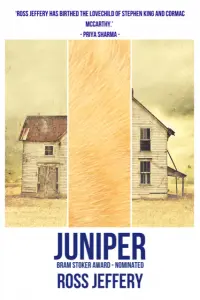 The first story I penned after this break was called "Bethesda," and it’s a modern retelling of the pool of Bethesda story found in the Bible. Instead of a pool, mine was set on a beach; instead of a crippled old man, mine had a father with a disabled son; instead of dipping into the pool to be healed, mine had a father drowning his son in the sea – but in both their faith had set them free.
The first story I penned after this break was called "Bethesda," and it’s a modern retelling of the pool of Bethesda story found in the Bible. Instead of a pool, mine was set on a beach; instead of a crippled old man, mine had a father with a disabled son; instead of dipping into the pool to be healed, mine had a father drowning his son in the sea – but in both their faith had set them free.
Similarities, but differences… faith and horror living hand-in-hand and side-by-side.
I’m pleased to say that I sold that story within a few days of having finished it, and that was the moment where my writing career took off. I felt as though God had given me a wink, that I was treading the path I’d lost along the way.
In 2019 I wrote Juniper, Tome, and Tethered (not all released then, mind you).
I knew I was still treading the right path when Tome, my most overtly religious horror novel, was nominated for a Bram Stoker Award. Tome is a novel about good and evil, about racism and the depravities of man. The afterword goes into a lot more detail about where the story came from, and I’m pleased and relieved to say that many people who’ve read the book and the afterword say it’s one of the best they’ve ever read. That book is special to me in more ways than I can say, but what I will say is that the reception this book had when it came out was as if God was tipping his cap to me: "Go on son, you got this."
I wouldn’t say all my books are overtly religious—you won’t find me sermonising in them (but who knows, maybe one day, if the story calls for a crazy preacher)—but the themes I tackle, the struggle between good and evil, light and dark and the spiritual realm are usually in there somewhere. You’ll also find a great deal of faith, hope, love, acceptance, sacrifice and a whole lot of scripture. So, that’s my catalyst, make of it what you will.
Let us pray!
Hahahaha… I’m kidding!
What would you alter about the way religion is portrayed in the genre if you could?
Honestly, I would love to just see religion portrayed correctly, and with an open mind.
I’ve read a lot of books over the years, and watched a lot of TV shows and films, and in the majority of their depictions of Christians (and other faiths for that matter) it would appear we’re all crazy, meddling-do-gooders, all of us are against abortion, all of us hate "the queers." We’re often portrayed as delusional, bigoted homophobes, and also whilst I’m on my soapbox, people have confused having a deep (passionate) faith with fundamentalism/radicalisation.
I’m here to say that this perception is not right.
This might be because that’s what people of no faith have assumed over the great many years, and I don’t truly blame them for that. It does seem that the louder the conservative Christians or the Imams spout their hateful rhetoric, the more those ideals stick. Their hate-filled words and viewpoints become the brush we’re all tarred with.
Unfortunately, that’s the trend which I keep seeing. It crops up all the time, and it’s getting rather irksome.
I’m not defending the church by any means, or those who preach violence and hate speech. There have been countless times where the Church—God’s tabernacle, run by fallen, broken people—has caused harm. People using scripture to further their own ideals and create hate. Many religions (Christianity included) have frowned upon LGBTQ+ issues, abortion, sex before marriage, divorce, suicide, mental illness; and that’s history, I can’t pretend it didn’t happen, because to do so would make me culpable in the long-lasting hurt, pain and suffering people have faced at the hands of the church.
But my church and my faith are not like those people, and I know for a fact that the Jesus I know certainly isn’t – the Jesus I know is about acceptance and tolerance, about transformation of the heart, soul and mind. He is about redemption and love. He loves me, because he loves me, because he loves me, just as I am.
The church as an institution has come a long way. It has blood on its hands, there’s no denying that fact, but not all Christians or Catholics share the outdated views of previous generations. As I said previously, that history has stained the way Christians are portrayed in fiction (and other media), of that there is no doubt.
But one of the best portrayals of Christianity and Catholosism and of faith in recent history, in my personal opinion, was Midnight Mass. This show was exceptional and a perfect example of religious horror. It went against the grain, showed faith clearly and without shame. Of course it had the do-gooders and the deluded followers, but it also portrayed the unwavering act of faith—devout faith at that—superbly. How the town was swept into hysteria by their belief in the miracles (the outpouring of the Holy Spirit) they were witnessing, how they were swept away with the outpouring of forgiveness and restoration of their mind, body and soul.
Midnight Mass also shows that Mike Flanagan cared a great deal about the believability of the story he was trying to tell. The biblical knowledge in the script and acted out on screen was fabulous, the passages of scripture he chose to use, which furthered his points showed great insight (scripture not quoted out of context), and the writing of faith and the fervour it can cause in its devout followers was just breath-taking to see on screen.
It was challenging to watch and I’m glad that Flanagan raised some important topics. The talk in the school about Bibles and Qurans was exemplary and award worthy. It was awkward to watch, because I’ve met a great many Christians who share Bev Keane’s views, but I loved it and seeing that play out on screen was a joy. But what blew me away was seeing a clearly "religious" story being given the space to shine on such a platform as Netflix.
I’m of the firm opinion that the Jesus I believe in wouldn’t be in most churches on a Sunday, he’d be out there with the forgotten, the broken, the victimized, the downtrodden, the alienated, the shunned, the addicted and the lost. We all fall short of the grace offered by Jesus, we’re all broken in some way (whether we choose to accept that or not), but he loves us all the same—all of us.
Is there a certain horror novel or film that, in your opinion, most accurately depicts Christianity or Catholicism?
Great question!
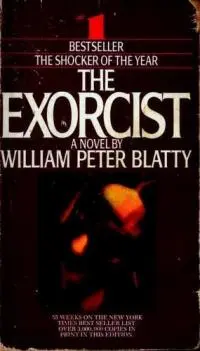 For a horror novel, it’s got to be The Exorcist in my personal opinion (trust me I’ve read a great many religious horror books). It paints a great picture of the struggles of a believer.
For a horror novel, it’s got to be The Exorcist in my personal opinion (trust me I’ve read a great many religious horror books). It paints a great picture of the struggles of a believer.
I think a lot of people think that when you discover faith… that your life is suddenly rosy. It’s not, and I can testify to that fact. Living by faith is a daily struggle, often to believe is to be counter cultural (not doing what the world does but doing what you believe God wants you to do), it's revolutionary thinking, it’s changing your attitude and the way you’ve been living your life, of being in the world but not of the world.
I feel The Exorcist perfectly highlights those struggles.
Take Father Karras, for example. He is struggling, firstly with his faith and with the responsibility his faith has laid on his shoulders, but there’s also the ongoing struggle of worthiness which plays out throughout the story (the book focuses on this aspect more than the film). He doesn’t feel good enough, strong enough, holy enough. And that’s the struggle with faith. Some days you’re flying high, the next you're grounded and consumed with doubt and guilt and the feeling of not being worthy of God’s forgiveness.
We all fall short of the glory of God, no one’s perfect. I’m certainly not.
Father Karras is a broken individual (consumed with guilt at not being at her bedside when she died – something Pazuzu frequently refers to during the exorcism) but God uses him for His glory towards the end of the story. That theme occurs again and again in the Bible too, it’s the Gospel message.
If you look at Saul who later became Paul (in the New Testament), he was a terrorist, leading hunting parties, killing Christians left right and centre. All of this took place before his conversion. Imagine how heavy his heart must have been, carrying his past and his unworthiness and guilt about all he had done before? But in God there is the forgiveness of sin, there is acceptance for the broken and the sinner and the outcast. That is what I feel comes across in The Exorcist, how God uses the broken and the downtrodden to further his plans and kingdom.
The depictions of demonic possession in the book are exceptional, horrifying in fact. Again, the loss of agency is a truly terrifying thing. But the demonic is real, people (I ain’t kidding you), that world – the spirit world – is something I believe in as much as I believe in Jesus, because if I fail to believe in that, if I just cherry pick what’s comfortable for me to believe in, it ends up being consumerism and not faith. If I chose that way of being, it would make a mockery of my belief and salvation in and through Jesus Christ.
Horror films that I feel accurately depict Christianity and Catholicism would be: The Passion of the Christ, an easy choice really. Some will say it’s not horror, but I beg to disagree (have you seen the barbarity in that film – oooff). There are many elements in there which are truly horrifying and terrifying, such as what happens to Judas and Jesus, and the depictions of the Devil in the film are chilling.
I also really enjoyed the depictions in The Exorcist of Catholicism and faith, but instead of flogging that dead horse, I’ll go with Deliver Us From Evil. That film actually scared me to my core. I hadn’t had such a strong reaction to a horror film for quite some time, but the demonic aspect of this one really got to me. Fingers of dread were crawling into my head and I literally had to pray myself to sleep afterwards.
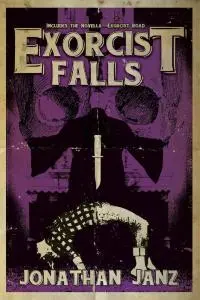 Also, this isn’t related, but I feel it needs a mention, and I’ll keep on shouting about this book until the world takes notice – Jonathan Janz’s Exorcist Road is phenomenal – it’s what the Exorcist 2 should have been. If you’ve not checked that out, you need to, it’s exceptional.
Also, this isn’t related, but I feel it needs a mention, and I’ll keep on shouting about this book until the world takes notice – Jonathan Janz’s Exorcist Road is phenomenal – it’s what the Exorcist 2 should have been. If you’ve not checked that out, you need to, it’s exceptional.
Which biblical tale do you think best captures the spirit of traditional horror?
There are two which I feel capture the spirit of traditional horror. One focuses more on the monsters of men (another trope I really love that works hand-in-hand with religious horror), the other more about possession.
The first is found in the book of Judges, Judges 19.
The main characters of this narrative are a Levite and his concubine and they visit a city to find shelter. While they’re taken in to the house of an elder it becomes clear that the inhabitants of Gibeah are not a hospitable bunch. They take great offence at these visitors turning up and also being shown refuge on their long journey. Soon, a bunch of the townsfolk demand that the owner hands the Levite over so they may know him (in the Bible the word "know" in this context is to have intercourse with someone – so, in this context they wanted to rape him) and do violence to him. The elder tries to turn them away, but they are persistent, and so he says:
“No, my brothers, do not act so wickedly; since this man has come into my house, do not do this vile thing. Behold, here are my virgin daughter and his concubine, Let me bring them out now. Violate them and do with them what seems good to you, but against this man do not do this outrageous thing.”
It goes on to say that the townsfolk knew her (that word again) and abused her all night until the morning and at the break of dawn they let her go where she crawled back to the door and awaited entry.
This tale is something that showcases the horror of the Old Testament and I feel bleeds into traditional horror and the monsters of men trope.
The second story, which leans more into the possession trope, is about Jesus and the legion of demons. It appears in a few of the Gospels but the version I prefer is the one found in Matthew 8:28. In it, Jesus is at Gadarenes, where he is confronted by two demon-possessed men who speak with Jesus and say, "What have you to do with us, O Son of God? Have you come here to torment us before the time?"
What I love about this piece of scripture is that the demons know of Jesus, they know him to be the Son of God, so it furthers my point on the spiritual realm being real, and that these agents of the Devil know Jesus from some other place, a time before. They also talk of ‘before the time.’ Scholars have said that they are talking about what is to pass when Jesus returns and fulfills what he’s promised.
The men Jesus talks to have many demon spirits in them and so call themselves Legion – you’ll note this term is used a lot in horror fiction and film, so, if you’re wondering, this is where it comes from—and Jesus casts them out of the men and into a herd of pigs, which subsequently run down an embankment and drown themselves in the water.
There’s a similarity to be found here with The Exorcist, the demon being evicted from the body of Regan and taking up host in Father Karras, (spoiler) who throws himself out of a window. I think this story of Jesus and the demons is something that has many parallels with modern horror and stories centred around possession. I’d even sight it as the possible source material of those choices, whether the writer was conscious of that decision or not, due to its popularity in films and books over the years.
What changes do you think the religious horror genre has undergone? What do you think it will address in the future?
In recent years Religious horror has become more character driven, focusing on a person’s individual faith/belief rather than focusing on the issues of the church and its various doctrines. It’s becoming less obvious, if that makes sense, with writers relying more on allegories based around Christian principles or scripture, and there is a lot of great use of Holy iconography (Eric LaRocca has done this often and to great effect). I prefer to use iconography in my work, instead of preaching from the pulpit and driving my views and beliefs down readers throats. There’s a subtler way of doing things now and I like it.
Religious horror is still evolving and long may it continue to do so, because it’s a rather exciting time for that subgenre. And let me just say: you don’t have to be religious to write religious horror. Just do the research and get it right.
I think the sky is the limit for what religious horror can address in the future, but I want to see it addressing big issues, opening up dialogues with those who have felt shunned by the church. It’s only in righting those wrongs (which are so often paraded as facts) that we’re able to change the sometimes negative viewpoints on religion. It’s how we build tolerance and acceptance of what we don’t understand or believe. It’s how we build patience and understanding—and if we’re able to do all of that, it’s how we learn to love one another and our differences.
Something I find prevalent in religious horror is the use of the Old Testament. From your observation, is it difficult to incorporate these ancient concepts into a contemporary world?
I don’t think it’s difficult, it’s just a matter of taking the source material and putting it in our time. For example, I’m a huge fan of the book of Exodus (you all know the story Moses and the plagues of Egypt), and I’m currently planning a collection of novellas which will bring that outdated story into the here and now. It features water turning to blood (Hapi), frogs coming from the Nile (Heket), days of complete darkness (Ra), death of cattle and livestock (Hathor), death of firstborn (Pharaoh), etc. I’m planning on setting it in today’s society, with the backdrop of gang culture and modern-day slavery (Egyptians and Israelites). I’m currently working out what people worship as gods in today’s culture, things such as fame, health, money, technology, etc., and I’ll be working out fun and disgusting ways to portray the plagues.
In your opinion, what is the greatest, most sincere moment of faith in horror?
This is a tough one, and I’m always finding beautiful sincere moments of faith in horror.
The Bible, believe it or not, is a horror, story but it’s also the greatest love story ever told.
Some may find my categorisation of the Bible as horror shocking. I’d say, "Go and read it and then come back to me." It has elements of horror throughout, especially in the Old Testament and Revelation. So, if I’m including the Bible, then obviously (to me at least), Jesus’ death on the cross is the very top of that list—the brutality that lead to his crucifixion and how through the grace he offered so freely, the love he poured out for me, the pain and punishment he took so I wouldn’t have to suffer the same fate—that means everything to me.
But I think you’re asking about horror fiction, so I’ll go with something I read recently.
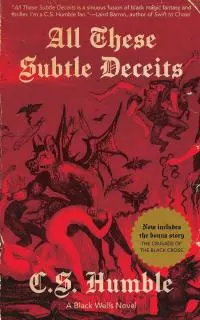 C.S. Humble’s Black Wells series is all kinds of special. There are currently two books, All These Subtle Deceits and All The Prospect Around Us, released by Dark Hart Books. If the books or C.S. Humble are not on your radar yet then you need to change that ASAP.
C.S. Humble’s Black Wells series is all kinds of special. There are currently two books, All These Subtle Deceits and All The Prospect Around Us, released by Dark Hart Books. If the books or C.S. Humble are not on your radar yet then you need to change that ASAP.
The first book deals heavily with demonic possession, and the scenes which involve the entity taking hold are both shocking and horrific. Humble’s use of scripture and iconography are exemplary, and give the reader a glimpse of something fresh and exciting in the realm of religious horror which is more in keeping with the faith I seek to profess in my own life. His work also reminds me of William Peter Blatty and his prose is utter magic. Trust me, it's transcendent.
But the sincerest moment of faith I’ve experienced in recent years came in book two of this series, All The Prosepect Around Us. There’s a section where two friends are discussing the difference between joy and happiness, and the conversation is so beautiful, so touching, so endearing and moving that I had tears in my eyes while reading it. There’s also another stunning section where our main protagonist ,Gabriel (a man of faith), is delivering a sermon which has been transcribed for the purposes of the book (I won’t tell you why, you need to read it to find out). This sermon goes some way in righting the wrongs people have felt with the church. It's powerful, brave and utterly beguiling. Then towards the end of the book we’re treated to a gospel-like message of hope and redemption which again brought a lump to my throat.
Are there aspects of religious horror you wouldn't want to confront readers with?
Open discussion about religion is important, so I don’t really feel there are any aspects of religion (Christianity) that I would worry about sharing or discussing in some way in my fiction.
There are lots of difficult passages and topics in the Bible. One of these topics concerns how women are seen—what they can and can’t do, if they’re clean or unclean, should be seen and not heard, etc. If these are taken out of context they appear gravely sexist and misogynistic (unfortunately some Christians still treat these as gospel truths – not allowing women to teach in church, etc.)
What we need to remember is that the bible was written at a different time and in a different place than where we are today. That’s not an excuse, but more a reminder that we need to address these outdated topics, themes, and challenging pieces of scripture with fresh eyes, in today’s world, and use our words to showcase that this is indeed not the state of play in today’s society.
I believe that only in talking about the Bible, discussing those challenging areas of scripture in a respectful and well-meaning way, where we are intent on listening to each other, can these outdated views be challenged, explained and reflected upon – and fiction is a great and safe place to do that.
What's one thing you want readers to know about your work?
It’s not preachy! Hahaha!
I’m of course a Christian, but I never ram it down your throat, and I’ll never intend to do so. There’s of course a lot of scriptural references, allegories, and iconography in there along with some challenging themes I want to address—themes which centre around good and evil, light and dark, supernatural and spiritual, but it’s never a sermon – fear not.
If you were to offer any advise to aspiring authors regarding religious horror, what would it be?
Do the research, get your scripture accurate, read study bibles, commentaries etc. There’s nothing more off-putting than reading religious horror (especially dealing with Christianity) where the author gets the details wrong.
Speak to people who have faith if you have none, there’s nothing wrong with that. I know people say write about what you know, but researching goes a long way to help you gain a better understanding of the themes or elements you’re wanting to cover. I’d highly encourage you to talk to people from faiths other than Christianity as well. It’s truly enlightening and I’m lucky enough to have friends of other faiths. My brother-in-law’s a Muslim and we have a great many discussion about religion while we’ve broken bread over the dinner table. Actually, something we discussed a while back I feel could be useful here, so please indulge me this final insight into faith.
My brother-in-law was talking about the Six Pillars of Faith (Belief in Allah, Belief in his Angels, Belief in his books, Belief in his messengers, Belief in the last day, belief in destiny), and I believe that writing is based on similar principles and pillars.
We need to believe in the story you’re trying to tell, we need to trust you’ve done your research, we need to have faith in your words, that you’ve had sensitivity readers look over your work (if you’re addressing challenging/difficult themes around faith) if you’re not a person of the faith you’re addressing.
If you haven’t done the above, then the roof on that story will fall down pretty sharp. The pillars you’ve built your story on won’t stand the test of time and you’ll either loose or offend your reader. I don’t see anything wrong with offending readers—good writing makes people uncomfortable (wow, look how much I’ve grown)—but there has to be a reason. Anything else is lazy and dangerous writing in my opinion.
We need to believe you’ve done the leg work to believe where you’re intent on taking us.
Get The Juniper Trilogy and other books by Ross Jeffrey a Bookshop or Amazon

About the author
Andrew Robert, "The Book Dad", is a voracious reader and reviewer of horror fiction. He is the curator of a promotional platform called Horror Oasis and the owner of DarkLit Press.
